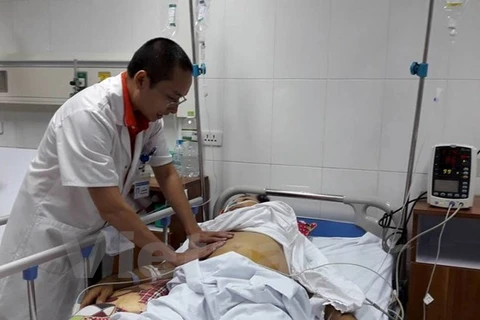 Citizens receive leaflets on diabetes in Hanoi on the occasion of the World Diabetes Day November 14 (Photo: VNA)
Citizens receive leaflets on diabetes in Hanoi on the occasion of the World Diabetes Day November 14 (Photo: VNA) Hanoi (VNA) - The number of diabetes cases in Vietnam has increased over the past decade, with the disease growing especially quickly among young people, doctors are warning.
Type 1 diabetes has become a childhood health problem, said Dr Le Thanh Hai, Director of the Central Pediatrics Hospital. About 40 to 50 children have been diagnosed annually in recent years at the hospital, compared to only five to 20 patients per year previously, he said.
"It’s spreading like an epidemic," he said.
Type 1 diabetes in children is on the rise in developing countries, including Vietnam, in large part because millions of kids are overweight, don’t get enough exercise and eat too many sugary and fatty foods. The trend is the tragic side effect of increasing wealth and access to food choices, including heavily processed items.
According to Dr Vu Chi Dung, head of the hospital’s Department of Endocrinology-Metabolism-Genetics, many parents still do not think that diabetes can occur in children. They ignore symptoms, such as weight loss, frequent thirst and urination, Dung said.
As a result, "by the time most children see a doctor, their condition is severe, and they suffer extreme fatigue, disorientation or comas," he said.
Unlike type 2 diabetes commonly seen in adults, type 1 diabetes in children progresses rapidly.
Many people with pre-diabetes and diabetes are not diagnosed and treated because they are not aware of their problems, doctors say. Diabetes is known as a silent killer because it only makes its presence fully known once it is already severe.
According to Dung, it is not hard to prevent diabetes by maintaining a healthy lifestyle and diet.
"The best way to reduce the risk is to encourage children to exercise daily in order to convert blood sugar into energy," he said.
According to the doctor the treatment of diabetes in children is more difficult than in adults because kids do not have the sense of danger that guides adults in prevention and control. This requires parents to pay special attention to the care and protection of their children’s health. The disease greatly affects not only the physical health, but also the mental health and cognition of the child.-VNA
VNA























